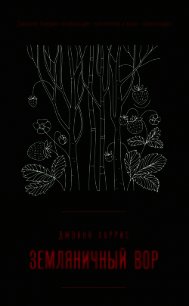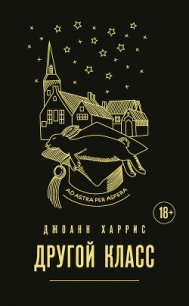Шоколад / Chocolat - Харрис Джоанн (версия книг .txt) 📗
Ознакомительная версия. Доступно 4 страниц из 32
I catch her up into my arms and kiss the top of her head. She smells of smoke and frying pancakes and warm bedclothes on a winter’s morning.
Why not? It’s as good a place as any.
“Yes, of course,” I tell her, my mouth in her hair. “Of course we are.”
Not quite a lie. This time it may even be true.
The carnival is gone. Once a year the village flares into transient brightness but even now the warmth has faded, the crowd dispersed. The vendors pack up their hotplates and awnings, the children discard their costumes and party favours. A slight air of embarrassment prevails, of abashment at this excess of noise and colour. Like rain in midsummer it evaporates, runs into the cracked earth and through the parched stones, leaving barely a trace. Two hours later Lansquenet-sous-Tannes is invisible once more, like an enchanted village which appears only once every year. But for the carnival we should have missed it altogether.
We have gas but as yet no electricity. On our first night I made pancakes for Anouk by candlelight and we ate them.by the fireside, using an old magazine for plates, as none of our things can be delivered until tomorrow. The shop was originally a bakery and still carries the baker’s wheatsheaf carved above the narrow doorway, but the floor is thick with a floury dust, and we picked our way across a drift of junk mail as we came in. The lease seems ridiculously cheap, accustomed as we are to city prices; even so I caught the sharp glance of suspicion from the woman at the agency as I counted out the banknotes. On the lease document I am Vianne Rocher, the signature a hieroglyph which might mean anything.
By the light of the candle we explored our new territory; the old ovens still surprisingly good beneath the grease and soot, the pine-panelled walls, the blackened earthen tiles. Anouk found the old awning folded away in a back-room and we dragged it out; spiders scattered from under the faded canvas. Our living area is above the shop; a bedsit and washroom, ridiculously tiny balcony, terracotta planter with dead geraniums… Anouk made a face when she saw it.
“It’s so dark, Maman.” She sounded awed, uncertain in the face of so much dereliction. “And it smells so sad.”
She is right. The smell is like daylight trapped for years until it has gone sour and rancid, of mouse-droppings and the ghosts of things unremembered and unmourned. It echoes like a cave, the small heat of our presence only serving to accentuate every shadow. Paint and sunlight and soapy water will rid us of the grime, but the sadness is another matter, the forlorn resonance of a house where no-one has laughed for years. Anouk’s face looked pale and large-eyed in the candlelight, her hand tightening in mine.
“Do we have to sleep here?” she asked. “Pantoufle doesn’t like it. He’s afraid.”
I smiled and kissed her solemn golden cheek.
“Pantoufle is going to help us.”
We lit a candle for every room, gold and red and white and orange. I prefer to make my own incense, but in a crisis the bought sticks are good enough for our purposes, lavender and cedar and lemongrass. We each held a candle, Anouk blowing her toy trumpet and I rattling a metal spoon in an old saucepan, and for ten minutes we stamped around every room, shouting and singing at the top of our voices – Out! Out! Out! until the walls shook and the outraged ghosts fled, leaving in their wake a faint scent of scorching and a good deal of fallen plaster. Look behind the cracked and blackened paintwork, behind the sadness of things abandoned, and begin to see faint outlines, like the after-image of a sparkler held in the hand – here a wall adazzle with golden paint, there an armchair, a little shabby, but coloured a triumphant orange, the old awning suddenly glowing as half-hidden colours slide out from beneath the layers of grime. Out! Out! Out! Anouk and Pantoufle stamped and sang and the faint images seemed to grow brighter – a red stool beside the vinyl counter, a string of bells against the front door. Of course, I know it’s only a game. Clamours to comfort a frightened child. There’ll have to be work done, hard work, before any of this becomes real. And yet for the moment it is enough to know that the house welcomes us, as we welcome it. Rock salt and bread by the doorstep to placate any resident gods. Sandalwood on our pillow, to sweeten our dreams.
Later Anouk told me Pantoufle wasn’t frightened any more, so that was all right. We slept together in our clothes on the floury mattress in the bedroom with all the candles burning, and when we awoke it was morning.
2
February 12, Ash Wednesday
Actually the bells woke us. I hadn’t realized quite how close we were to the church until I heard them, a single low resonant drone falling into a bright carillon dommm fla-di-dadi dommmm – on the downbeat. I looked at my watch. It was six o’clock. Grey-gold light filtered through the broken shutters onto the bed.
I stood up and looked out onto the square, wet cobbles shining. The square white church tower stood out sharply in the morning sunlight, rising from a hollow of dark shopfronts; a bakery, a florist, a shop selling graveyard paraphernalia; plaques, stone angels, enamelled everlasting roses… Above their discreetly shuttered facades the white tower is a beacon, the roman numerals of the clock gleaming redly at six-twenty to baffle the devil, the Virgin in her dizzy eyrie watching the square with a faintly sickened expression. At the tip of the short spire a weathervane turns – west to west-northwest – a robed man with a scythe. From the balcony with the dead geranium I could see the first arrivals to Mass. I recognized the woman in the tartan coat from the carnival; I waved to her, but she hurried on without an answering gesture, pulling her coat protectively around her. Behind her the felt-hatted man with his sad brown dog in tow gave me a hesitant smile. I called down brightly to him, but seemingly village etiquette did not allow for such informalities, for he did not respond, hurrying in his turn into the church, taking his dog with him.
After that no-one even looked up at my window, though I counted over sixty heads – scarves, berets, hats drawn down against an invisible wind – but I felt their studied, curious indifference. They had matters of importance to consider, said their hunched shoulders and lowered heads. Their feet dragged sullenly at the cobbles like the feet of children going to school. This one has given up smoking today, I knew; that one his weekly visit to the cafe, another will forgo her favourite foods. It’s none of my business, of course. But I felt at that moment that if ever a place were in need of a little magic… Old habits never die. And when you’ve once- been in. the business of granting wishes the impulse never quite leaves you. And besides, the wind, the carnival wind was still blowing, bringing with it the dim scent of grease and candyfloss and gunpowder, the hot sharp scents of the changing seasons, making the palms itch and the heart beat faster. For a time, then, we stay. For a time. Till the wind changes.
We bought the paint in the general store, and with it brushes, rollers, soap and buckets. We began upstairs and worked downwards, stripping curtains and throwing broken fittings onto the growing pile in the tiny back garden, soaping floors arid making tidal waves down the narrow sooty stairway so that both of us were soaked several times through. Anouk’s scrubbing-brush became a submarine, and mine a tanker which sent noisy soap torpedoes scudding down the stairs and into the hall. In the middle of this I heard the doorbell jangle and looked up, soap in one hand, brush in the other, at the tall figure of the priest.
Ознакомительная версия. Доступно 4 страниц из 32




